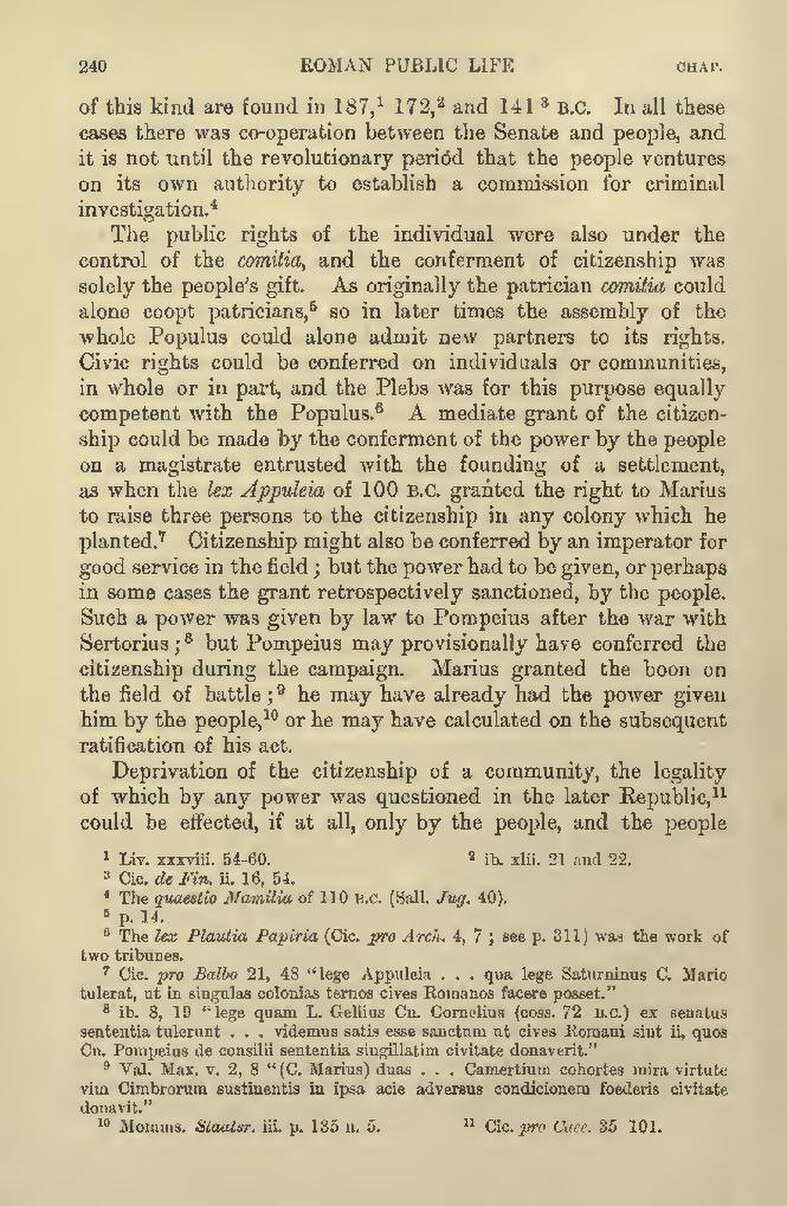of this kind are found in 187,[1] 172,[2] and 141[3] B.C. In all these cases there was co-operation between the Senate and people, and it is not until the revolutionary period that the people ventures on its own authority to establish a commission for criminal investigation.[4]
The public rights of the individual were also under the control of the comitia, and the conferment of citizenship was solely the people's gift. As originally the patrician comitia could alone coopt patricians,[5] so in later times the assembly of the whole Populus could alone admit new partners to its rights. Civic rights could be conferred on individuals or communities, in whole or in part, and the Plebs was for this purpose equally competent with the Populus.[6] A mediate grant of the citizenship could be made by the conferment of the power by the people on a magistrate entrusted with the founding of a settlement, as when the lex Appuleia of 100 B.C. granted the right to Marius to raise three persons to the citizenship in any colony which he planted.[7] Citizenship might also be conferred by an imperator for good service in the field; but the power had to be given, or perhaps in some cases the grant retrospectively sanctioned, by the people. Such a power was given by law to Pompeius after the war with Sertorius;[8] but Pompeius may provisionally have conferred the citizenship during the campaign. Marius granted the boon on the field of battle;[9] he may have already had the power given him by the people,[10] or he may have calculated on the subsequent ratification of his act.
Deprivation of the citizenship of a community, the legality of which by any power was questioned in the later Republic,[11] could be effected, if at all, only by the people, and the people
- ↑ Liv. xxxviii. 54-60.
- ↑ ib. xlii. 21 and 22.
- ↑ Cic. de Fin. ii. 16, 54.
- ↑ The quaestio Mamilia of 110 B.C. (Sall. Jug. 40).
- ↑ p. 14.
- ↑ The lex Plautia Papiria (Cic. pro Arch. 4, 7; see p. 311) was the work of two tribunes.
- ↑ Cic. pro Balbo 21, 48 "lege Appuleia . . . qua lege Saturninus C. Mario tulerat, ut in singulas colonias ternos cives Romanos facere posset."
- ↑ ib. 8, 19 "lege quam L. Gellius Cn. Cornelius (coss. 72 B.C.) ex senatus sententia tulerunt . . . videmus satis esse sanctum ut cives Romani sint ii, quos Cn. Pompeius de consilii sententia singillatim civitate donaverit."
- ↑ Val. Max. v. 2, 8 "(C. Marius) duas . . . Camertium cohortes mira virtute vim Cimbrorum sustinentis in ipsa acie adversus condicionem foederis civitate donavit."
